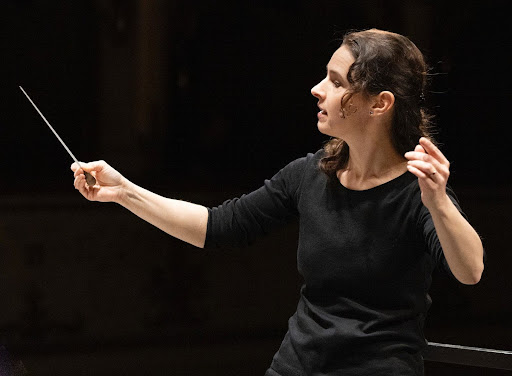by Mike Telin

This week, Lyniv will continue her string of firsts when she makes her Cleveland Orchestra debut on Thursday, July 11 at 7:00 pm at Severance Music Center. The program, which is part of the Summers at Severance series, includes Leoš Janáček’s Suite from The Cunning Little Vixen, Sergei Rachmaninoff’s Rhapsody on a Theme of Paganini with Inon Barnatan as soloist, Borys Lyatoshynsky’s Grazhyna, and Igor Stravinsky’s Suite from The Firebird. Tickets are available online.
“I am very excited to be making my debut with The Cleveland Orchestra,” Lyniv said during a telephone interview. “I am also excited about the program, and creating it was a long discovery process — I wanted it to be interesting to me, to the orchestra, and of course to the public.” She said that the thread that links the four pieces is a connection to the natural world.
Janáček’s opera The Cunning Little Vixen recounts the adventures of a clever fox, other wildlife, and a few humans. “Vixen is special because it was the first time that a composer used an animal as the main character in an opera, along with humans,” she said. “A friend told him that giving animals a voice would not work, but he did it anyway. The story makes you think about what it means to be a human as well as part of the animal ecosystem. And July 3 was Janáček’s 170th birthday.”
Although the Rachmaninoff was chosen by Inon Barnatan, Lyniv said that it fits perfectly into the program. “It comes from his late period and is full of emotion. He was often criticized for being old fashioned, even in his own country. But even people who are unfamiliar with classical music are inspired by his music.”
The work Lyniv is especially excited to bring to Cleveland is Borys Lyatoshynsky’s symphonic poem Grazhyna. “I was happy to learn that a work of his was on the Orchestra’s wishlist.”
Lyatoshynsky was part of the new generation of 20th-century Ukrainian composers, as well as a conductor and teacher. “Like Stravinsky, he suffered from political oppression. He was accused of writing music that was too complicated. At the composers union when the symphony read his piece, the musicians were asked to stand to say what they thought of it — he was accused of formalism.”
Composed in 1955, Grazhyna is based on Adam Mickiewicz’s poem of the same name. It tells the story of a female chieftain who led her people into war against the Teutonic Order. “It’s a beautiful piece,” Lyniv said. “The protagonist is a woman not unlike Joan of Arc. She put on her husband’s clothes and led the troops into war. And like Joan of Arc, she too was burned at the stake. But she is a hero and heroes never die, they remain in history.”
The conductor said that although Igor Stravinsky’s Suite from The Firebird is a well-known work, many don’t know that the composer had Ukrainian roots. “His mother was Ukrainian and his family had an estate in Ukraine, where they spent their summers. The house has been renovated, and until the invasion, there was also a festival. It was touching to see how proud the people of the village were to have a connection with Stravinsky.”
Training young musicians is very important to Oksana Lyniv — in 2016 she founded the Youth Symphony Orchestra of Ukraine. And following the outbreak of the war in 2022, she became a co-initiator, along with Slovenian and Ukrainian youth orchestras, of the Music for the Future project, an evacuation music camp for young Ukrainian musicians in Ljubljana, Slovenia.
“When the invasion happened, everyone was shocked and we knew we had to get the young people to a safer place,” Lyniv recalled. “It wasn’t only the young musicians who went to Ljubljana, their families went as well. But when I arrived there, it was so touching to see how soon all the young people could sit together and rehearse. It was therapy for them. The ages 13 to 24 are the most vulnerable, I’m happy to help them not feel lost.”
Returning to the topic of firsts, I asked Lyniv what it felt like to conduct the opening night of a new Bayreuth Festival production of Der fliegende Holländer, and also to be the first woman ever to conduct at the Festival.
“I am happy and proud to be the first,” she said, adding that while it was very exciting, because of COVID restrictions it was not without its difficulties.
This summer Lyniv will conduct The Flying Dutchman at Bayreuth for the fourth year in a row. She is excited to return to lead the same production and continue to address the acoustical issues of the Festspielhaus.
“The orchestra pit is under the stage, but I enjoy the challenge of figuring out how to better manage the acoustical problems. I’m happy to be leading it again this summer. And speaking of women — Wagner’s female characters were all very independent, and this year there are more female conductors at Bayreuth than men. I’m leading Flying Dutchman, Nathalie Stutzmann is leading Tannhäuser, and Simone Young is conducting the Ring cycle.”
Photo by Marco Caselli Nirmal
Published on ClevelandClassical.com July 9, 2024
Click here for a printable copy of this article


